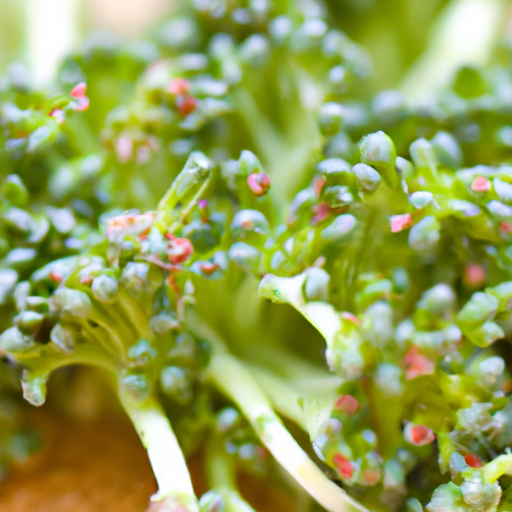The Mighty Broccoli Sprouts: Nutritious and Versatile
If you’re a fan of healthy eating, then you’ve probably heard of broccoli - that popular green vegetable packed with vitamins and minerals. But have you ever tried broccoli sprouts? These little green powerhouses are not only delicious but also incredibly nutritious. In this blog post, we’ll dive into the world of broccoli sprouts, exploring their taste, common uses in cooking, nutritional value, and some interesting history and facts.
A Burst of Flavor
Broccoli sprouts have a distinct taste that sets them apart from their fully-grown counterparts. They offer a milder, fresher flavor with a hint of sweetness. Some describe it as a cross between cabbage and radish, making these sprouts a versatile ingredient to play with in your recipes.
Culinary Delights
When it comes to cooking, broccoli sprouts are incredibly versatile. Here are a few popular ways to incorporate them into your culinary creations:
1. Salads and Sandwiches
Add a delightful crunch and a burst of flavor to your salads or sandwiches by tossing in some fresh broccoli sprouts. They pair wonderfully with other greens, adding both texture and a unique taste.
2. Stir-Fries and Sauteed Dishes
Broccoli sprouts can be a fantastic addition to stir-fries, adding a vibrant color and a slightly peppery kick to your dish. Sauté them with other vegetables or proteins for a quick and healthy meal.
3. Smoothies and Juices
Don’t limit broccoli sprouts to just savory dishes! Blend them into your favorite smoothies or juices for an extra dose of nutrients. They blend well with fruits like apples, pears, and berries, adding a refreshing twist to your beverage.
4. Garnishes and Toppings
Sprinkle some broccoli sprouts over your finished dishes as a garnish or topping. They not only add an attractive pop of color but also provide a delightful contrast in texture.
The Power of Nutrition
Now, let’s talk about the nutritional value of these tiny green wonders. Broccoli sprouts are not only low in calories but also packed with essential vitamins and minerals. Here are a few key nutrients found in these sprouts:
- Vitamin C: Broccoli sprouts are an excellent source of vitamin C, known for its immune-boosting properties.
- Vitamin K: They also provide a good amount of vitamin K, which is vital for blood clotting and bone health.
- Dietary Fiber: Fiber is important for a healthy digestive system, and broccoli sprouts are a great way to incorporate more fiber into your diet.
- Antioxidants: These sprouts are rich in antioxidants, such as sulforaphane, which has been linked to various health benefits.
Unveiling the Past
The history of broccoli sprouts is quite interesting. It all started thousands of years ago when their parent plant, broccoli, was first cultivated in the Mediterranean region. However, the sprouts themselves gained popularity relatively recently due to their high concentration of beneficial compounds.
Fun Fact Corner
Here are a few fascinating facts about broccoli sprouts:
- Broccoli sprouts were developed during the 1990s by scientists who wanted to find a way to unlock and maximize the health benefits of broccoli.
- They are a potent source of sulforaphane, a compound that has shown promising anti-cancer properties in numerous studies.
- Just a small handful of broccoli sprouts can provide the same amount of sulforaphane present in a pound of mature broccoli.
So, whether you are looking to diversify your culinary creations or boost your nutrient intake, broccoli sprouts are a fantastic choice. Their unique taste, versatility in the kitchen, and impressive nutritional value make them an excellent addition to any meal. Give these tiny green powerhouses a try, and unlock a world of flavor and health benefits!
Facts about Broccoli Sprouts:
Origin: Broccoli sprouts are the young, tender shoots or seedlings of the broccoli plant (Brassica oleracea). They are cultivated from broccoli seeds and harvested when they’re around 3-4 days old.
Common Uses: Broccoli sprouts are commonly used in salads, sandwiches, wraps, smoothies, and as a garnish. Due to their mild flavor, they can also be added to soups, stir-fries, and other cooked dishes.
Nutritional Benefits: Broccoli sprouts are highly nutritious. They are rich in vitamins A, C, and K, as well as folate. They also contain important minerals like calcium, potassium, and iron. Moreover, broccoli sprouts are a great source of dietary fiber and contain beneficial antioxidants.
Unique Properties: One of the most notable properties of broccoli sprouts is their high concentration of a compound called sulforaphane. Sulforaphane is a powerful antioxidant and is known for its potential health benefits, including anti-inflammatory and anti-cancer effects. It is also believed to support heart health and digestion.
Historical Significance: Broccoli sprouts gained popularity in the 1990s due to their high sulforaphane content. Since then, they have been extensively studied for their potential health benefits. Research has focused on their anti-cancer properties, as well as their impact on oxidative stress, inflammation, and other health conditions.
Remember that while broccoli sprouts have potential health benefits, it’s always important to maintain a balanced diet and consult with a healthcare professional regarding individual dietary needs and any specific health concerns.




Use the share button below if you liked it.
It makes me smile, when I see it.